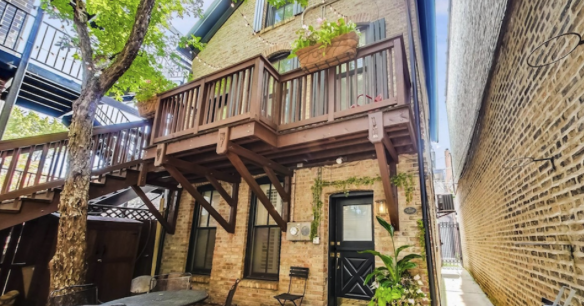Link to full article at Crane's Chicago Business
Chicago had the opportunity to deliver two significant housing reforms, but aldermen’s desire to preserve the political machine got in the way.
On July 16, the Chicago City Council approved an ordinance proposed by Ald. Daniel La Spata, 1st, that would reduce parking requirements for housing in desirable, transit-rich neighborhoods such as mine. Score one for housing development.
Yet, they deferred on another important housing initiative to expand "granny flats" citywide. It’s not too late for city leaders to keep the positive trend in expanding housing options and pass that one too. Together, it will fully unleash housing opportunities in Chicago and help Chicagoans reduce rent costs.
Available research shows ordinances, such as the one just passed that completely removes the strict parking minimums for new residential developments, increase housing affordability. Its passage shows there is opportunity to put aside aldermanic control in pursuit of housing abundance.
Stringent parking mandates hinder builders and make housing more expensive. Above-ground parking in Chicago can cost $29,000 per space to construct and raise rents by 17%. That matters when 43% of Chicago households are already struggling with housing costs. Nearly one in four spend over half of their income just to keep a roof over their heads.
Beyond driving up costs, these mandates can make housing developments on smaller parcels of land completely impossible because there’s not enough room to add a parking spot. These smaller developments are particularly important because, by filling in smaller spaces, they promote walkable neighborhoods that support the city’s professed environmental goals such as reducing pollution. They can also provide a smaller, more affordable source of housing near job centers and community amenities, increasing socioeconomic diversity and family flourishing.
But importantly, they don’t really matter and are unnecessarily burdensome. When I moved to Chicago nearly a year ago. I had a general sense of where I wanted to live, but the decision ultimately came down to one key factor: public transportation.
While my apartment offers some on-site parking, I and many other young people who live there don’t need it. Instead, we make use of the six bus lines that stop just feet from the front door, or the train stop just a few blocks west. We’re not alone.
By allowing developers to forgo the previous special permission required from the local alderman to eliminate parking, it will become easier to build a variety of new housing. It will introduce much-needed flexibility — and Chicago needs flexibility.
Unfortunately, too often, council members fear the loss of aldermanic control that comes with increased flexibility. That control is what prompted aldermen to defer another housing ordinance, which would have expanded the ability to build granny flats and attic apartments in residential areas across the city.
Additional dwelling units are currently limited to five pilot areas, which unfairly limits which families can reap the benefits of these small units and leaves all the power in developers’ hands.
But expanding ADUs would empower homeowners and everyday residents to improve their own neighborhoods and lifestyles. Louise D’Agostino can now take daily walks with her granddaughter because her family was able to build a conversion unit on their property. Joseph Miscimarra was able to move closer to economic and social opportunities downtown because of a coach house for rent in Lakeview.
The ability to age in dignity with your family or access affordable housing shouldn’t be reserved for families in a few select neighborhoods. Chicago is short more than 120,000 affordable housing units, and the state of Illinois needs to build 227,000 during the next five years to keep up with demand. That means opportunities for flexible housing need to be made available across the city without so much aldermanic oversight.
For some aldermen, that control reflects a desire to preserve neighborhood character and ensure adequate parking. For others, it serves as a tool to block unwanted development or maintain political leverage or even foster corruption. Whatever the motivation, if the city wants to move toward affordability, equity and sustainability, aldermen must be willing to give up at least some of that control.
Aldermen must be willing to embrace housing abundance at the City Council meeting in September and pass this ADU ordinance. Only then can Chicago truly help residents afford the housing they need.

